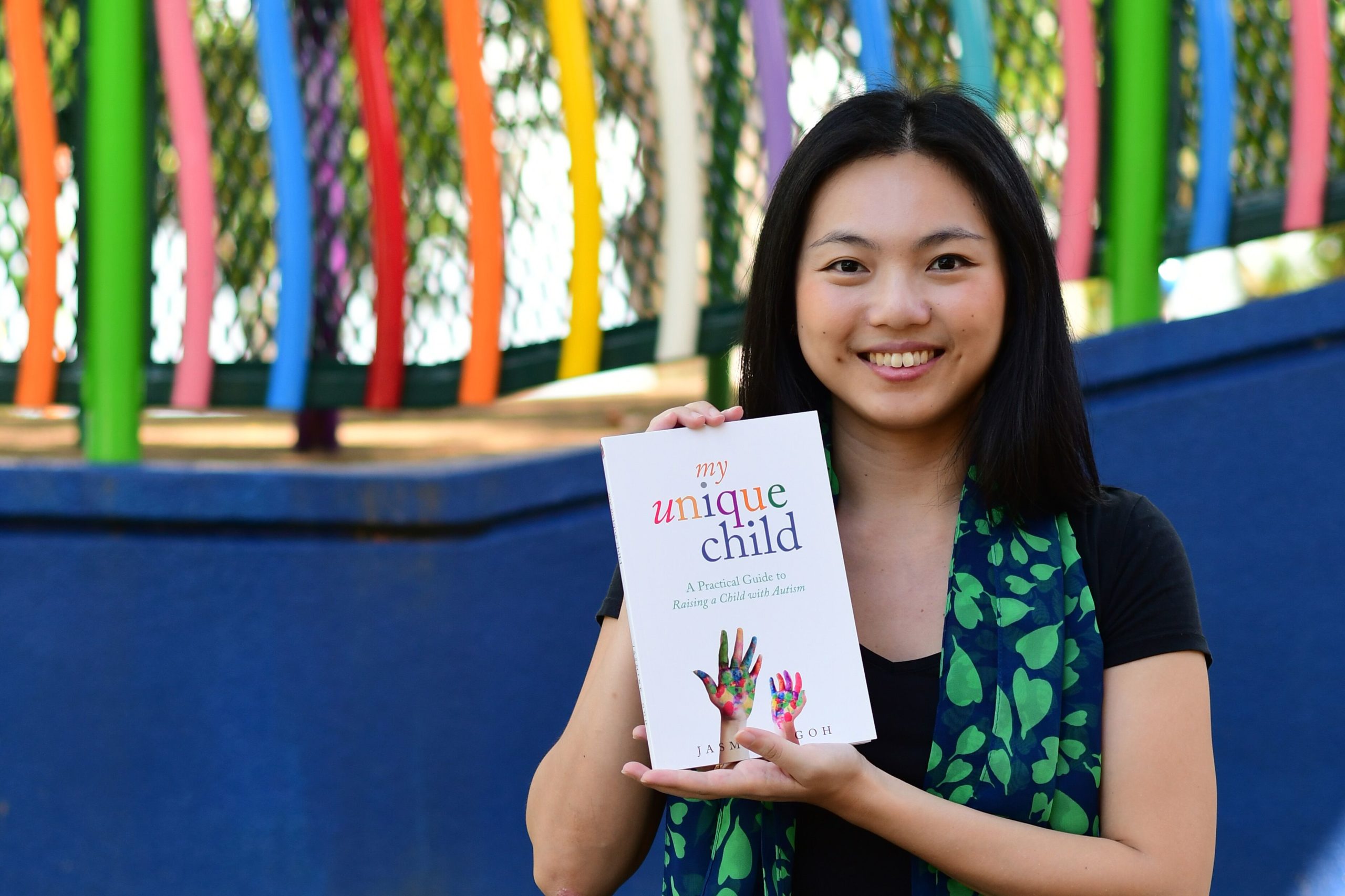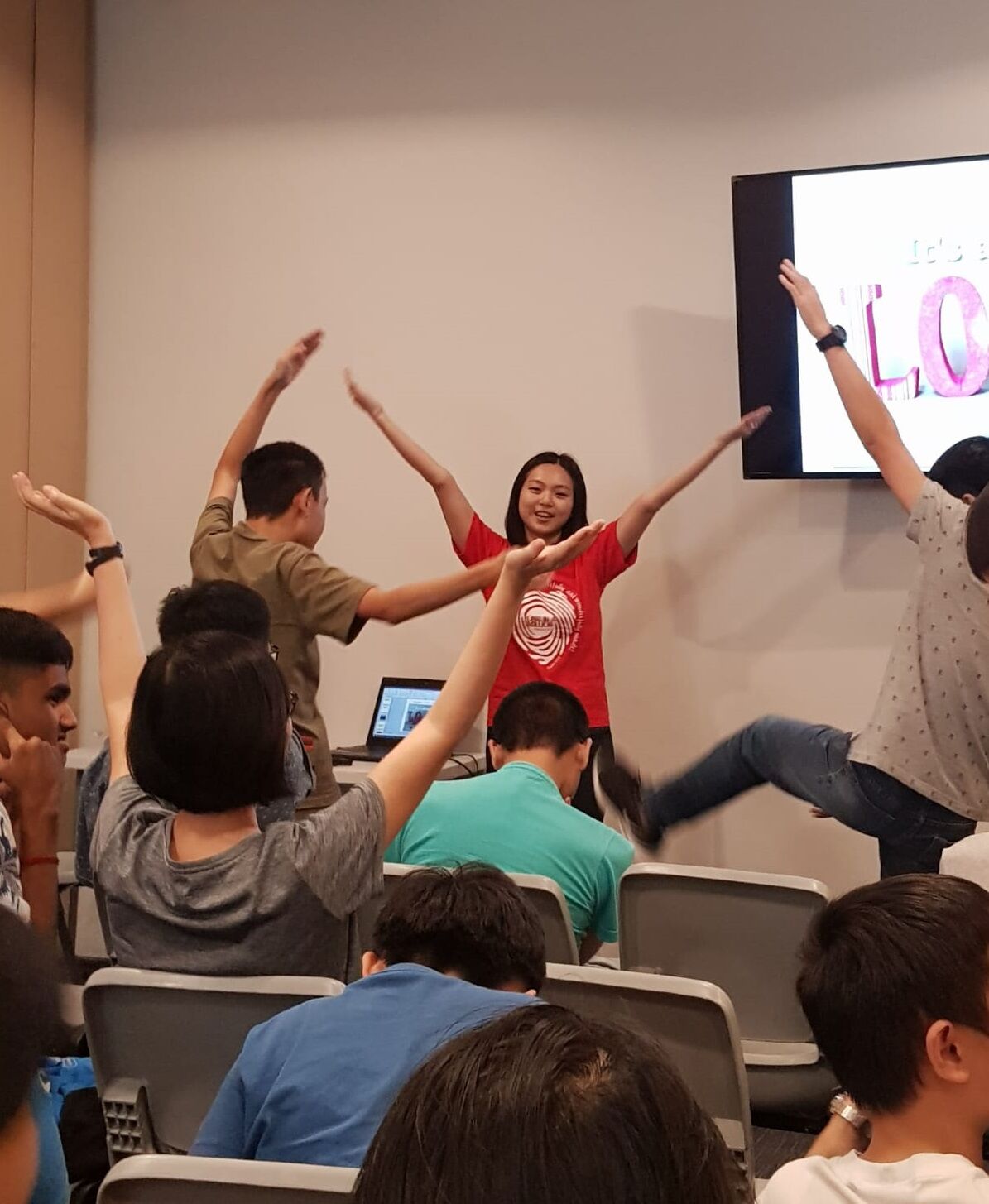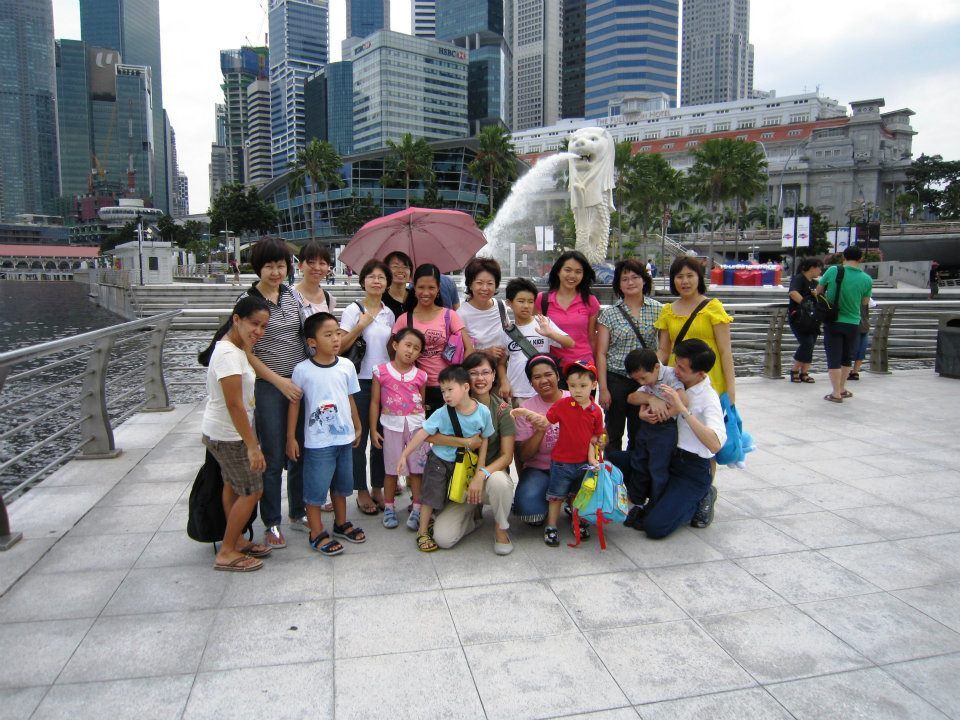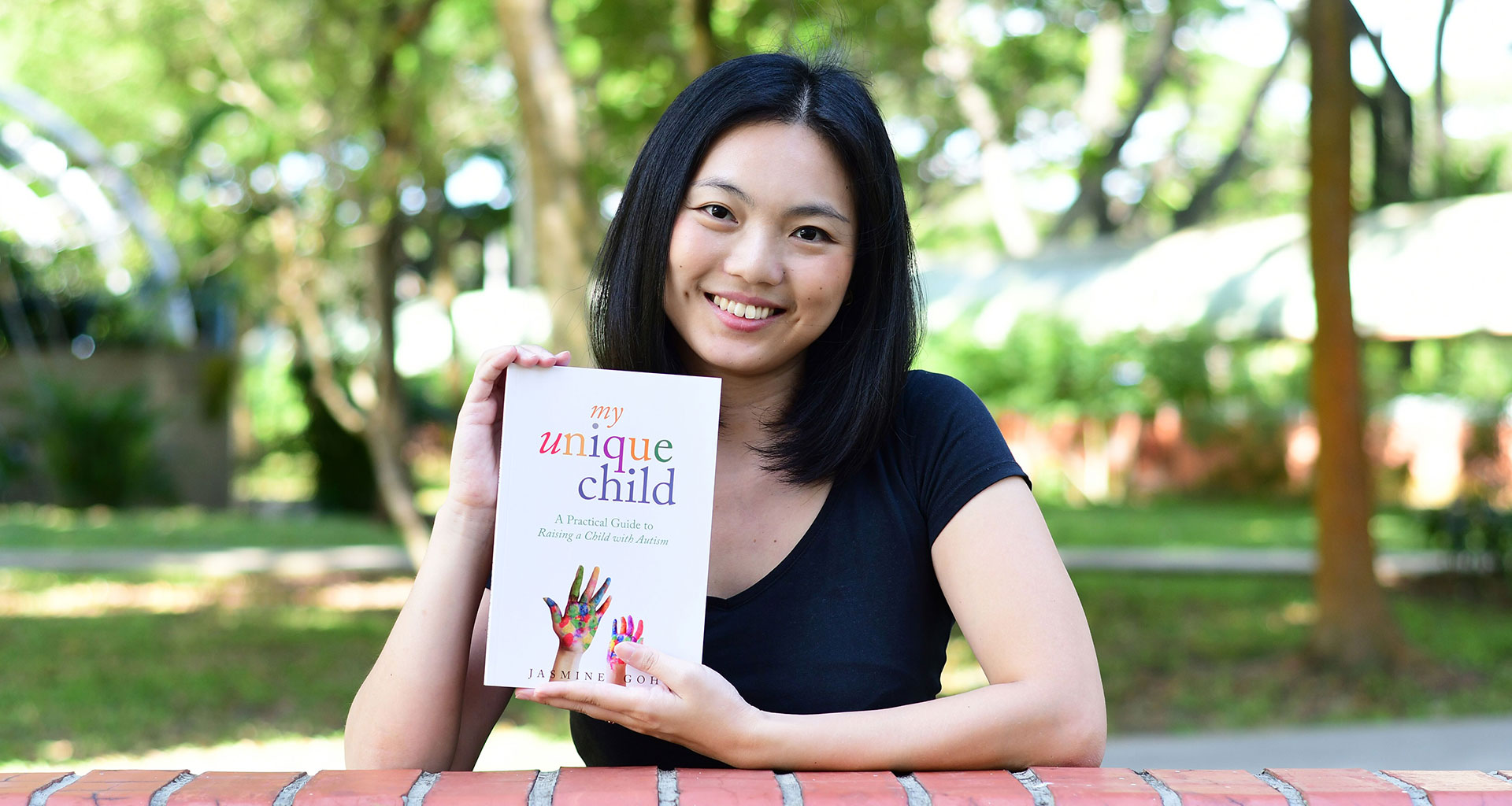
It was a common yet heartbreaking story. A mother who had an autistic son had tried everything she knew to have him cured. She prayed desperately and brought him to countless pastors and healing rallies—but nothing changed.
Finally, she came to a “state of surrender”.
That, says Jasmine Goh, was when the mother came to see her son not as a problem that needed to be fixed, but as a child with his own gifts, talents, and strengths. She began to see the opportunities and assurances that God would give her and her son.
Jasmine with her book, My Unique Child.
That same child, who was diagnosed with Autism Spectrum Disorder, later published a book featuring his own illustrations of Bible stories.
“I’ve found that when parents come to an acceptance of their child’s diagnosis, their parenting is very different,” says the author of a book for parents of autistic children. “Instead of a mind-set that their child needs to be ‘normal’, they begin to relax and realise that they are not solely responsible for the child—God is, and He will take care of them.”
Coming to Terms with Special Needs
It’s something that Jasmine has seen many times over 10 years serving in Shalomkids, a ministry at St. Andrew’s Cathedral that reaches out to children with autism.
Coming to terms with their children’s condition, she has found, is one of the biggest challenges that parents face in their journey with their special-needs children. And it’s even harder in Singapore.
“We’re so accustomed to aiming for a successful family and career, and smart kids,” she notes.
“When parents come to an acceptance of their child’s diagnosis… they begin to relax and realise that they are not solely responsible for the child—God is, and He will take care of them.”
A lot of parents have high expectations, and if their children don’t live up to them, they take it personally. They love their kids, but they cannot accept their condition. It’s very hard to accept that a child is different.”
“But I don’t fault them,” she adds, “we grow up in this environment where everyone wants to be happy and successful.”
This aspect of parenting can be somewhat unique to Asian societies, which is why Jasmine wrote My Unique Child: A Practical Guide to Raising a Child with Autism.
While researching autism, she discovered that there was a dearth of literature on this topic for Asian parents.
Talking with numerous parents, educators, and mental health and special needs experts around Singapore, she drew on her skills as a writer and her own experience at Shalomkids to come up with a practical guide.
Jasmine (in red) at Shalomkids, a ministry for special-needs children at St. Andrew’s cathedral.
“Let your child be your guide”
While My Unique Child has many practical and useful tips, Jasmine has found that developing the right understanding and mindset of autism is often the hardest part of the special-needs journey.
Many parents, she has observed, keep trying to “cure” their children instead of learning to work with their condition and help their kids cope with life.
One mother, she recalls, spent many years trying to get her autistic son into a mainstream school. When this didn’t happen, she aimed for an “elite” special school.
But her son still couldn’t qualify, so she had to settle for a “normal” special school. She was disappointed until another mother told her: “Don’t follow the crowd blindly, let your child be your guide. Follow him.”
“That woke her up,” says Jasmine. “She realised she had been chasing after what she thought was good for her child, but never saw what her child really needed. What she really needed to do was to teach her child to be independent, to have life skills.”
“Don’t follow the crowd blindly, let your child be your guide. Follow him.”
But it was also significant that it took another parent to help the mother realise this. Community support, concludes Jasmine, is important for families struggling to raise an autistic child.
It fulfils what 1 Corinthians 12:25–26 teaches about unity in the body of God—“ that there should be no division in the body, but that its parts should have equal concern for each other”.
“All parents have their own turning point, but when they have people in the same situation who support them, they come to accept their children’s condition earlier,” she says. “When they see other families in the same boat, they realise they are not alone.”
Stories That Encourage
That’s why Jasmine urges parents to keep sharing testimonies of their struggles and victories. Doing this, she says, can help themselves as well as other parents in a similar situation.
“When you tell a story, you start to reflect on your own journey, and to see outside yourself,” she explains. “It can bring a bit of closure and healing.
You may also see that your story can help other families, and help society become more understanding. That’s the power of stories—they change the lives of the special needs-community as well as those of people outside.”
Jasmine herself has decided to keep sharing testimonies of parents and children who have conquered overwhelming odds. (You can find them at ouruniquestories.com.)
These testimonies, she adds, are also a great witness to God’s love for families with special-needs children. At Shalomkids, she’s even seen families come to Christ through their children.
“People see how Christian parents continue to trust in God despite their difficult situation,” she says.
“A Christian parent can say, ‘My child is God’s child, and He will look after him.’ This faith helps to take the burden off them, and they tend to be more relaxed. They still have to take care of their children day to day, but they know that at the end of the day, God is in control.”
Jasmine (back row, third from right) at an outing in 2010 with Shalomkids,
a ministry for special-needs children at St. Andrew’s cathedral.
God Loves His Special Needs Children
One way God has shown He is in control, says Jasmine, is in the way He speaks to His beloved children directly. She has witnessed this in how autistic children seem to understand God’s truths even if they don’t always show it at first.
“Sometimes, when we teach them about God, we’re not sure how much they understand,” she says. “But many years later, they’ve come up to us and told us, ‘You did teach me this a few years ago.’ That’s when we realise how powerful the Holy Spirit is. We have our words and lesson plans, but it’s the Holy Spirit who is teaching them. That’s why parents can trust their kids to the Lord.”
“We have our words and lesson plans, but it’s the Holy Spirit who is teaching them. That’s why parents can trust their kids to the Lord.”
One parent, recounts Jasmine, realised how true this was when she taught her autistic child to pray.
“She said it was the best life skill she could have taught her kid,” recalls Jasmine. “She told her child, ‘If you are alone, lost, or feel angry or frightened, there is always one person you can talk to—Jesus.’”
She points to the promise of 2 Corinthians 1:3–4: “Praise be to the . . . God of all comfort, who comforts us in all our troubles, so that we can comfort those in any trouble with the comfort we ourselves receive from God.”
Other parents have also discovered how much God ministers to special needs children. “Sometimes when the child gets worked up at home and the parent doesn’t know what to do, they tell the kid, ‘You sit there and you tell God what you feel. You settle it with God.’ And they find that it works!”
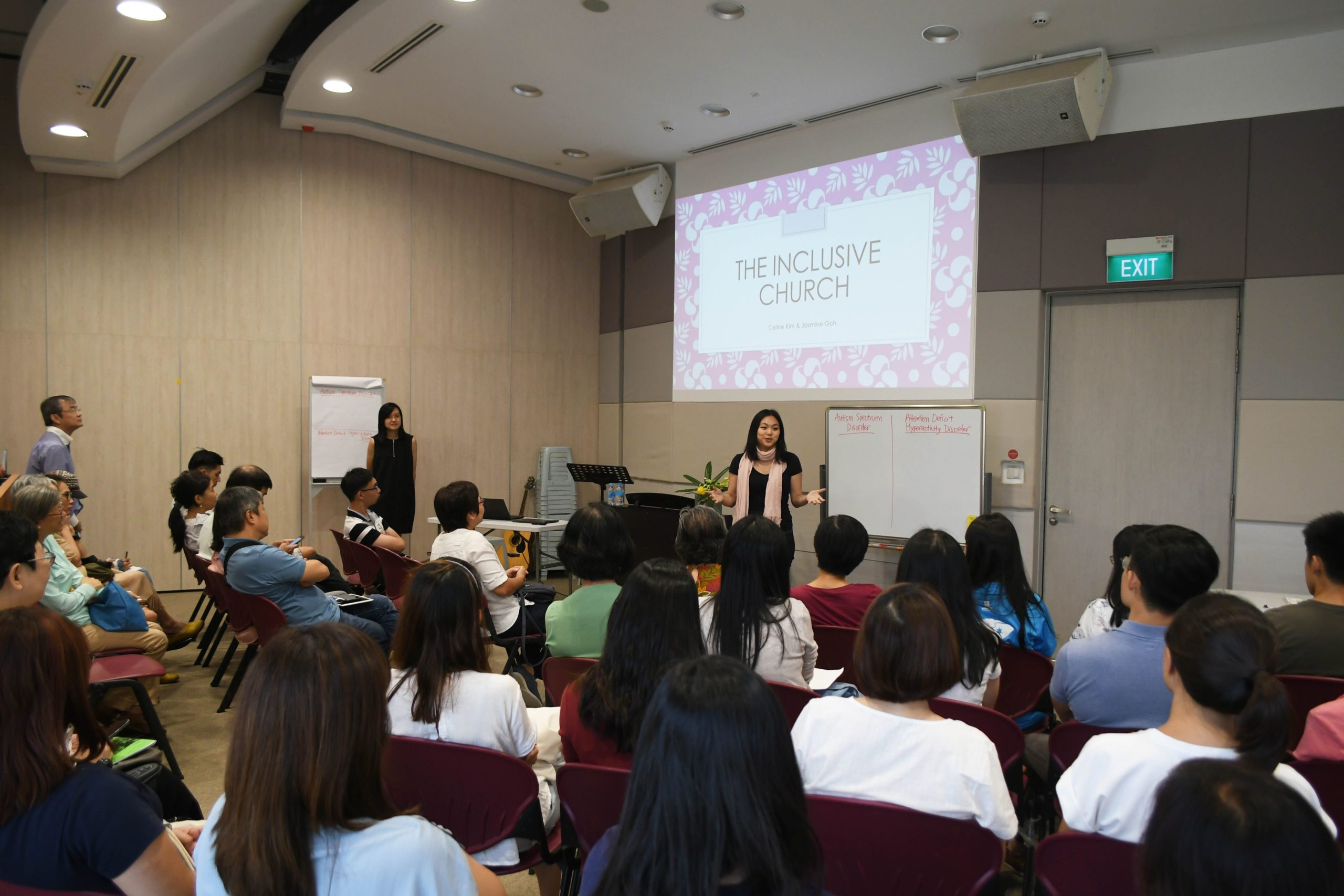
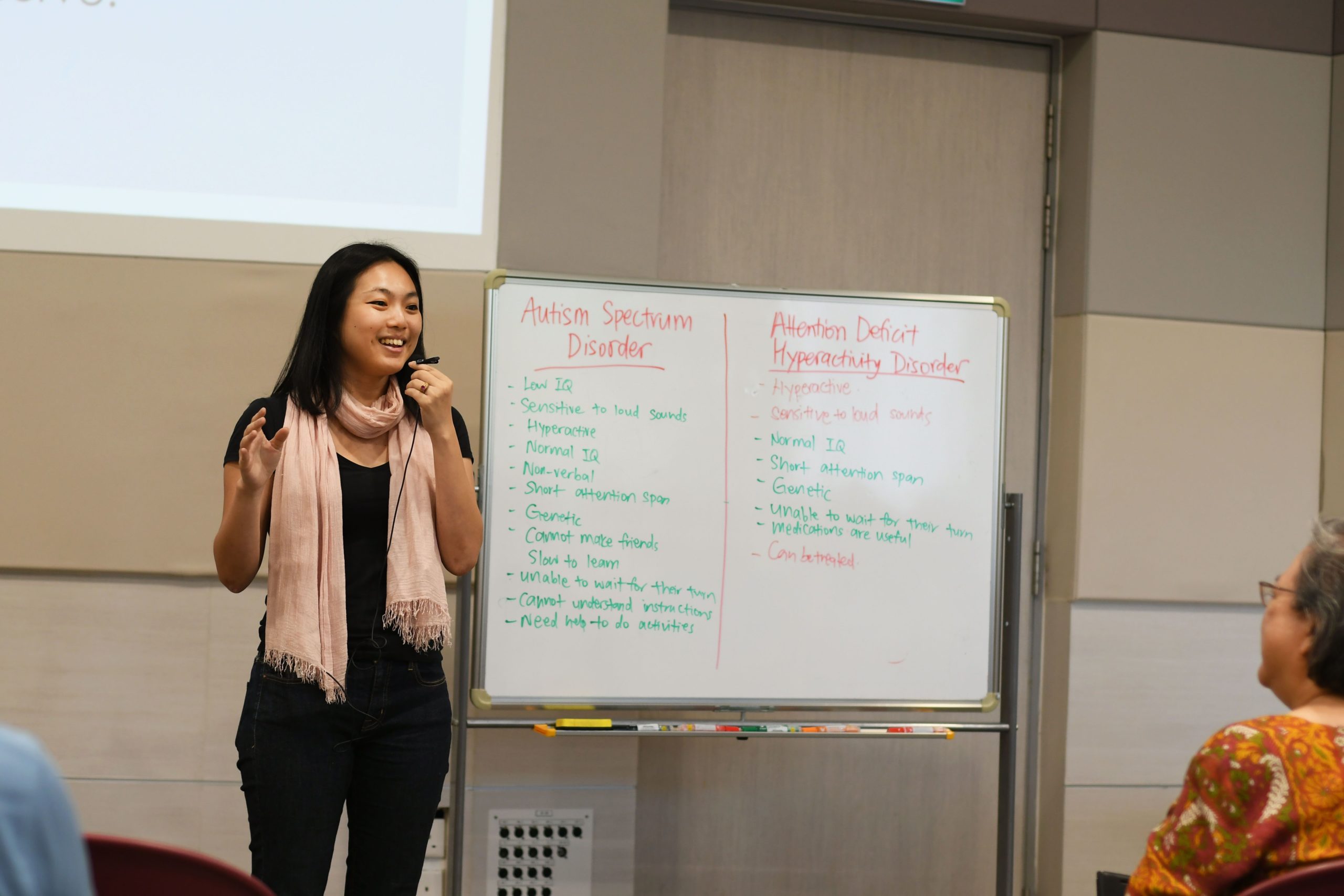
Jasmine (with scarf) giving a talk on how churches can include special-need children in their communities.
Unique to God
Jasmine’s journey with special needs children has also given her a glimpse of God’s heart for these children.
“I believe God sees them as His creation, just like any other of His children,” she says. “I don’t think He sees them any differently. He relates to each one of them personally and in their own unique way.”
“Special-needs children aren’t here to be our project, our inspiration, or to serve as a warning against sin. They are here to glorify Him, just as we are.”
This belief of hers straddles common views held by many Christians regarding disability and special needs, with some saying that they are a result of an imperfect, sinful world, and others saying that God has allowed them for a purpose.
Jesus’ healing of a blind man (John 9:1–3) is often cited in this context.
But Jasmine also believes that parents can take inspiration from Genesis 1:27 (“So God created mankind in his own image”) and Matthew 5:16 (“Let your light shine before others, that they may see your good deeds and glorify your Father in heaven”).
“I believe God sees them as His creation, just like any other of His children. I don’t think He sees them any differently. He relates to each one of them personally and in their own unique way.”
“These two groups are not wrong in what they say,” she says, “but I look forward to the day we stop justifying the existence of disability and special needs and start seeing them as fellow human beings created by God. The reason for the blind man (John 9) being on earth is no different from the reason we are on earth—to glorify God.”
She adds: “Special-needs children aren’t here to be our project, our inspiration, or to serve as a warning against sin. They are here to glorify Him, just as we are.”
“I believe God sees them as His creation, just like any other of His children. I don’t think He sees them any differently. He relates to each one of them personally and in their own unique way.”
Jasmine (back row, centre left) at a Christmas event organised by Shalomkids,
a ministry for special-needs children at St. Andrew’s cathedral, in 2016.
Jasmine’s Tips on Accepting Your Child’s Condition
- Acknowledge your feelings about having an autistic child, such as denial, guilt, anger, shame, and grief. These feelings are real, and take time to understand and manage. Seek help to deal with them if needed.
- Understand what autism really is, so that you know what your child is capable of and what help he or she needs. Each autistic child has unique potential as well as limitations.
- Talk to other parents of special-needs children for support, especially those who can help you stay positive.
Tips are taken from Jasmine Goh, My Unique Child: A Practical Guide to Raising a Child with Autism (Stoutville, Ontario: Black Card Books, 2018).
For more information about Jasmine’s book and her stories, visit ouruniquestories.com.

